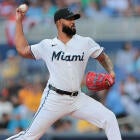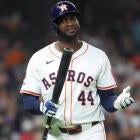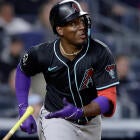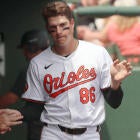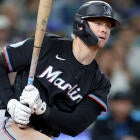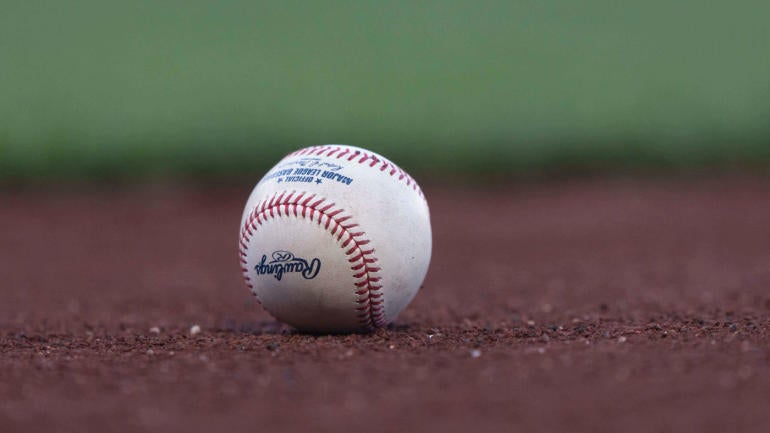
Let me run a scenario by you. You're sitting at your computer hard at work when an email alerts you to a trade offer from such-and-such a team.
How do you feel? Excited? Hopeful? Invigorated by the opportunity for a healthy back-and-forth that will improve the status of your team?
Not if you're like me. What I feel is something closer to dread, like "oh God, what do I have to say no to this time?" It's not that I don't want a trade. It's that I'm almost certain I don't want that trade. And it's probably so far off from my thinking that I may not be able to disguise my disgust.
To use a common parlance, it's cringe. Trading has become cringe! Search your feelings. You know it to be true.
How about some data to back up the claim? In a recent polling of my Twitter followers -- most of them Fantasy Baseball junkies, one would assume -- more than half of the 3,800 respondents said that they don't enjoy trading as much as they used to. That's a considerable number.
Do you enjoy trading in Fantasy Baseball as much as you used to?
— Scott White (@CBSScottWhite) June 25, 2023
And it pains me to say it. When I first started playing Fantasy Baseball some 20-odd years ago, trading was everything to me -- more fun than the draft, more fun than winning itself. A good trade could give me a high that would take days to come down from.
Now? It still feels good, but in the way that putting the finishing touches on a chest of drawers from Ikea feels good. Sure, you have something new -- something that you may have even needed -- but mostly, you're just glad that it's over.
My fear in writing this article is that people will stop offering me trades, but that's not actually what I want. What I want is to examine how we've gotten to where we are in the hope of improving the experience, whether that means setting more realistic expectations or putting aside our past baggage so that we can operate from a more honest place. Rest assured, I still send out trade offers myself, but it's with more grumbling and muttering and an expectation of disappointment.
Many of the respondents to my poll expressed similar frustrations, and their feedback actually created the basis for this article. You'll find their comments scattered throughout.
Also featured is Fred Zinkie, who's currently a contributor for Yahoo Fantasy Sports and probably the one Fantasy Baseball analyst most known for his trading prowess. He burst onto the scene a little more than 10 years ago, turning heads with the number of trades he made, and went on to win multiple Tout Wars championships as well as other high-profile contests.
Guess what? He's not so keen on trading anymore either.
"I'm trading way less often," he told me via direct message. "When I was talking trade, I would feel a rush of enthusiasm when I got a new email from the other owner. But I started to get the sense that some of the other owners felt the exact opposite feeling when it was time to talk trade. I didn't enjoy that feeling."
If even the great Fred Zinkie has soured on trades, then there must be something to this. So here are, in my estimation, the contributing factors to our widespread trade malaise.
There are no novices anymore
When I say that trades were what first hooked me on Fantasy Baseball, that's not an overstatement. It started with me trading for every Braves player I could in my first year (2000, to be specific), conflicted by the idea of cheering for a player on some other team (such innocence). Not surprisingly, I finished in the lower third of the league, but I was new then, not really knowing what I was doing but nonetheless eager to get my hands dirty.
How quickly I caught on. In Year 2, trading was once again the fulcrum of my strategy, only this time not for my amusement but rather my glorification. I wanted to bend the league to my will, leaving no doubt who the superior player was, and being a headstrong 17-year-old, I was pretty sure I could accomplish it.
I noticed that in my league of only 10 teams, players were constantly emerging on the waiver wire who I'd like to pick up if I could only make room for them. Rather than dump one quality player for another, I realized I could package two quality players for a slight upgrade, thus creating space for the player I wanted without sacrificing value. String together enough of those 2-for-1 trades, each time for a slight upgrade, and I'd eventually have the No. 1 player at every position. I'd be invincible!
What gets me looking back on it is how readily they all said yes. Understand that I hadn't shared my Fantasy Baseball obsession with my friends yet. I was playing in a public league, populated by faceless strangers who knew nothing more about me than my name and roster. They wouldn't have to face me the next day (or ever, for that matter), which gave them license to respond to my offers as ruthlessly as they saw fit (or more believably, not at all).
But what they did was say yes, over and over and over again, with very few nos along the way. It wasn't just one pushover either. I'm pretty sure I traded with all of them at least once. And by season's end, I had indeed secured the top player at every position. My team was stupid good.
Still, why did they say yes? It's inconceivable now, like the Fantasy Baseball equivalent of a big fish story. I had enough success with trading in the years that followed (this time against people I actually knew) that I never paused to reflect on it. It's only looking back now that I can appreciate how completely things have changed in just a couple decades.
I can only theorize that in those halcyon days of playing in the Fantasy sandbox -- that's actually what the site was called, Sandbox.com -- we were all novices. Fantasy Baseball certainly existed before then, but not with the ease and accessibility afforded by putting it online. And we, as children of the internet age, were all too eager to partake, having nothing but time to kill and conquests to be won.
What it meant is that everyone was a novice. Maybe some of us had a year or two head start, but everyone was both new and also sure that he knew more than the other guy. We were primed for mistakes, in other words, and some of us made more than others.
The Fantasy Baseball base continues to grow every year, so it's of course not literally true that there are no novices anymore, but they're vastly outnumbered by a core that's been around long enough to know what a bad offer looks like.
Nobody is willing to get burned
I'll say this for those faceless victims of my repeated 2-for-1 offers: they learned. Not just them but millions of others like them eventually got the message that quality trumps quantity, particularly in shallower leagues with ample waiver wires. In fact, such offers are so easily spotted now that they're basically a punchline, nicknamed for whatever person in your league is most notorious for making them, and then rejected out of hand.
It makes for an entire trade structure that's simply dead on arrival, and while the most obvious example, it's hardly the only case of our collective wisdom ruling out what once was possible. That same core of Fantasy Baseballers that's been taking its lumps for decades-plus has become suspicious to a fault, jaded by every misstep of its past.
Everyone is afraid of getting fleeced. Win one trade and if you play with the same people every year they remember it forever.
— Jesse Fuchs (@jesse_fuchs) June 25, 2023
The euphoria of a successful trade, uplifting though it may be, doesn't compare to the agony of a botched one, which burns for all of eternity. I've made more of the former, but it's the latter that I'm more likely to retell, treating my past self with a contempt normally reserved for a driver racing through interstate traffic. It seems so obvious now, you dummy. Why couldn't you see it then?
I’d much rather hold a player and live with the outcome than have severe regrets about trading, so I’ve tried to avoid trading unless the risk is relatively low. But rarely is it low lol
— Dominic Pappagallo (@DominicPappa) June 25, 2023
By now, everyone knows that feeling, and when everyone is acting from a place of trauma, gridlock is the inevitable result. The only way to find common ground is to be the one who accepts a little more risk, and that's a tall order for a naturally risk-averse person.
I have to overpay now to do any trade at all it seems..
— Rodger Williams (@kiddwikked) June 25, 2023
Everybody knows too much
I mentioned that 2000 was my first year playing Fantasy Baseball. That's two years before the Athletics' Moneyball season, three years before the release of the book and 11 years before the release of the movie. Sabermetrics was only beginning to go mainstream, and it took many more years (not to mention knockdown drag-out fights on the internet) for it to become widely accepted.
And yet even those concepts, however forward-thinking they were at the time, seem almost quaint following the introduction of Statcast in 2015, a revolutionary tracking system that so closely approximates the outcome of a batted ball that it's hard to gain an analytical edge apart from it. It's not perfect, of course -- there is no perfect when predicting future outcomes -- but it's so close to perfect that to go against it is a losing proposition.
Trade negotiations are legit impossible with 98% of home league players. With the explosion and accessibility of advanced stats nowadays everyone’s an expert.
— Roger Dorn Night (@DornCorp) June 26, 2023
Much of the mystery has been removed, in other words, making honest-to-goodness-disagreements over players much more the exception than the rule. And what greater impetus for a trade is there -- or was there, anyway? Now, trades are mostly a matter of matching up needs, which makes for far less of a trading pool. When there are no other offers to drive up the cost, you're less likely to be satisfied with the return.
It’s hard in baseball I feel like to get legit value because people look at so many factors. Pre season ADP, last 14 days to last 30 days, season rank compared to what they are doing now, etc, etc.
— matt white (@mattwhite85) June 25, 2023
We've all grown up
In the years leading up to the Twitter poll that launched this entire article, I assumed that my souring attitude toward trading was largely a "me" thing, brought about by my stage of life. Knowing now that it's widely shared ... I still think stage of life has much to do with it.
Ah, but we're not all in the same stage of life, you say. And to that, I respond ... maybe we are? Of course, that's not literally true, but I keep coming back to the idea of us children of the internet age all discovering Fantasy Baseball together and more or less sticking with it (because why would we give up something so fulfilling?). Those of us who were teenagers then are now hurtling toward middle age and all the responsibilities that go with it. To put it more bluntly, we're knee deep in babies.
When managers in your league become parents, half of them disappear from the trade market
— Billy & the Cloneasaurus👦🦖 (@JurassicMike) June 25, 2023
It's the sort of thing you have to experience to appreciate fully, the way your entire life folds into the size of a postcard when that first child enters the world. You go from feeling like you have no time to wondering what you used to do with all your time as, one by one, seeming non-negotiables buckle under the weight of pure survival. Exercise. Showers. Sleep, certainly. Your life becomes less about meeting your own needs than meeting someone else's, a tradeoff of leisure, hygiene and altogether being the most put-together person you can be so that you can know the divine purpose of bringing up the next generation.
And while for the sake of your own sanity, you do still find time for the couple things you most enjoy (even if it means sacrificing more sleep), one activity that almost certainly doesn't make the cut is sitting around dreaming up trade scenarios that likely won't come to fruition.
Remember Fred Zinkie, the uber successful Fantasy Baseball player who made his bones through trading? He's reached a stage in life where playing the market no longer seems worth it.
"I used to do all the work. That's how I made so many deals," he said. "I made the original offer and I often made all the counter offers. It worked. But now that my kids are older, I don't have time to do all of that."
Trading is an inherently creative process, and what we crave most in this stage of life is efficiency, not creativity. When your driving force is finding a 15-minute window to watch a small part of a TV show that you've claimed to be binging for the past, um, six months, a dead-end trade negotiation is a genuine back-breaker. If it doesn't come together easily, it's not going to happen.
"Some owners were so bad at trade talks. When I say 'bad' I mean that they add no ability to think creatively, have an open mind, look at all angles, maintain regular communication, etc.," Zinkie said. "I think that good leagues need a couple people like the 2010-15 version of Fred Zinkie. I might be able to bring that version back in 2028."
I take it that's when the kids are out of the house.
Nobody wants to engage
Of course, nothing slows down the trade process more than an unwillingness to engage. I can't tell you how many times I've planned out a sequence of four trades, meant to take place one right after another, only for it never to leave the starting gate because the first offer goes unanswered. You want to give the other person time, understanding that people are busy, but how long? Twenty-four hours? Forty-eight? Two weeks? By that point, the circumstances for the rest of the trade sequence have changed, and this has all been a colossal waste of time.
It is very frustrating when you offer a fair trade and don't get a response. There is a reason the " Decline trade" is available
— Randy Kohler (@ranjok17) June 25, 2023
It's the most common complaint I get about trading -- i.e., offers that go unanswered indefinitely. Can you presume the lack of response is itself a response, or could it be that it's still under consideration? You could always retract it, sure, but the whole reason you offered it is because you wanted it. If there's even a puncher's chance, you'd like to see it through.
Well, I'm happy to report that after much deliberation and banging my head against a wall, I've come up with a pretty effective way of prompting a response from the person on the other end. You ready for this? I text him.
It may seem obvious to some, but I'm the sort of person who makes it a top priority not to annoy others. I don't always succeed in that regard, but I try. Therefore, texting a Fantasy Baseball acquaintance -- as in the sort of person who I'd never text otherwise -- is a major concession on my part. It feels a lot more intrusive than an email to me, but in a way, that's the point. If you want to force a response from someone, you have to get in his face a little. Since I began doing it, I've been surprised to discover how often an implied "no" (due to a lack of response) was actually a "yeah, I meant to follow up but forgot about it."
That's not always true, of course, but it's true often enough to justify the mild discomfort. And then once you have that person's ear, you can get a back-and-forth going that actually leads somewhere. It's a much more efficient way of doing things, and in a stage of life when efficiency is paramount, that's something to celebrate.
Then again, I don't have everyone's number in every league. Do you?
The league is in constant flux
Between the juiced ball, the universal humidor, the de-juiced ball, the shift ban and the pickoff limits, it's fair to say we've spent the past few years playing catch-up to a league that's still sorting out what brand of baseball it wants to sell. It's been enough to make you think twice about making any big moves for borderline cases, particularly in dynasty leagues.
Respondents to the Twitter poll focused mostly on this year and specifically changes to the starting pitcher landscape, saying they couldn't get a handle on it with all the blowout outings even for presumed high-end types.
I think this year has been unique because I just have zero feel for how good any of the pitchers are or how good they will be moving forward. There hasn’t been a year since I’ve played FBB (7yrs) where I feel like I’ve disagreed with the value of players more than this year
— Austin Soukup (@austin_soukup) June 26, 2023
I myself have made reference to "the glob" at starting pitcher, referring to a group of 60 or so after the top 15-20 who function almost like a random number generator, delivering anywhere from one earned run in seven innings to eight earned runs in three. And yeah, in this year's environment, I'm not sure exchanging one piece of the glob for another is particularly advantageous.
Clearly, though, the problem of an ever-changing pitching environment isn't limited to this year. The inconsistencies didn't just begin now, and neither did our trading troubles. Are the former the primary explanation for the latter? I would say not, but they certainly haven't helped to facilitate trades.
Certain people have developed a reputation
One Twitter respondent who competed against me in the Podcast League last year (and won, actually) pointed out something that would have been unmannerly for me to declare on my own. So I guess I'll just go for it and say that part of the reason I have trouble getting people to trade with me is because I'm, well ... me.
I will say that trading with you in particular is more complicated. By the time you’ve targeted someone, that’s my clue as the counter-party that I should hold that asset. Your success and status has completely iced and chilled any trade market you would have otherwise had.
— inthedougout⚾️ (@inthedougout) June 25, 2023
I've been told this outright before, and I guess it makes sense after 16 years representing a major media company in the Fantasy Baseball space. It took much longer than you'd think for my reputation to work against me, though. In the early years, people seemed all the more eager to trade with me just to prove I was full of it or something. Remember how I said novices are both new and also sure that they know more than the other guy? Fair to say some of that attitude was on display then.
But we've all outgrown it now, right? The people who've seen what I can do through trades don't want it to happen to them, and I'll admit that much of my frustration with the current trade scene stems from my recognition that the more I trade, the better I do. Surely the people who've played against me the longest have noticed this as well.
This isn't just about me, though. The point is that the same goes for you. Most likely, you've shared a league with many of the same people for a number of years now. If you've enjoyed success, then it stands to reason your opponents will drive a harder bargain with you. That's not so much to punish you as to protect themselves. If you want to make this deal so badly, then gosh, maybe it's not so good for them.
I have the same problem in my home lg (16 team). I have had a ton of success over the years and now if I show interest in a player, the other mgr tends to hold. If I really like a guy I have to overpay.
— Kevin Warman (@warmake) June 25, 2023
As an example I offered kershaw and Abbott for McLain and was turned down.
Everybody is stretched too thin
Surely this is true for me and many others in the professional Fantasy Baseball ranks, but what about the civilians?
Probably because everyone plays in 20 leagues and only trade in the ones they are winning.
— adam scott (@asgoldy) June 25, 2023
Well, perhaps it's true for them, too. After all, roster management has become more streamlined, contests more varied, information more available. I'm sure there are many who still ride or die for their home league, but if you live for Fantasy Baseball, you likely decided years ago to live more abundantly.
It's something Fred Zinkie spoke to as well. "I used to own 2-3 teams," he said. "I knew the Tout Wars rosters in my league in great detail. Now, so many industry people own more than 10 teams. It's hard to lock it in on trading in any one league when that's the case."
Naturally, if your attention is divided, you can't give as much of it to any one league, especially when trade negotiations are more time-consuming than we'd like them to be in the first place. I'll admit that much of my trading attention goes to my Dynasty leagues these days. That format requires significantly more roster pruning, for obvious reasons.
Not enough attention is paid to trading
It could simply be that the reason trading has fallen out of fashion in Fantasy Baseball is because we analysts no longer emphasize it to the extent we once did.
Part of the reason is that when we're struggling to make trades ourselves, for all the reasons outlined already, what advice is there to offer, really? But I suspect that the bigger reason is the widespread embrace of the National Fantasy Baseball Championship (NFBC) in recent years. It's come to dominate Fantasy Baseball commentary with its high-stakes games and big cash payouts even though a small percentage of the audience actually participates in it.
I'm not sure this disparity serves anyone well, and part of what's lost in the exchange is trade commentary. There's no trading allowed in NFBC for the simple reason that having so much money on the line might invite more tomfoolery. That's all well and good, but what about the many people who don't play NFBC and can make use of trading?
To be fair, trade content was always a tough nut to crack. General advice doesn't allow for repeat viewings, and specific advice speaks to an audience of one. Usually, trade commentary takes the form of buying low and selling high on particular players, but again, with the kind of information available to us now, mostly by way of Statcast, it's unlikely two seasoned managers are going to disagree much over a player's future production.
So how do we get out of this? Fred Zinkie, not surprisingly, has some thoughts.
"In general, I think that the industry would benefit from more people learning how to trade," he said. "It's teaching people how to see the other rosters in their league from many different angles and see their own roster from many different angles in order to see all the possible trade avenues. Of course, all of that takes time."
And time, as we've covered, is in short supply for so many of us. He may need to offer a crash course.
![[object Object] Logo](https://sportshub.cbsistatic.com/i/2020/04/22/e9ceb731-8b3f-4c60-98fe-090ab66a2997/screen-shot-2020-04-22-at-11-04-56-am.png)








